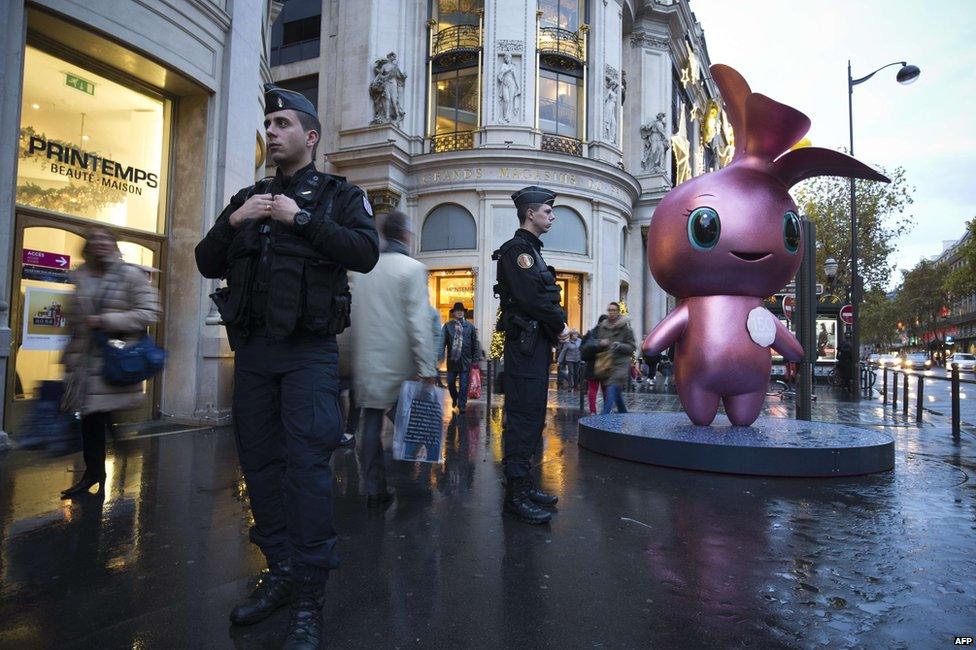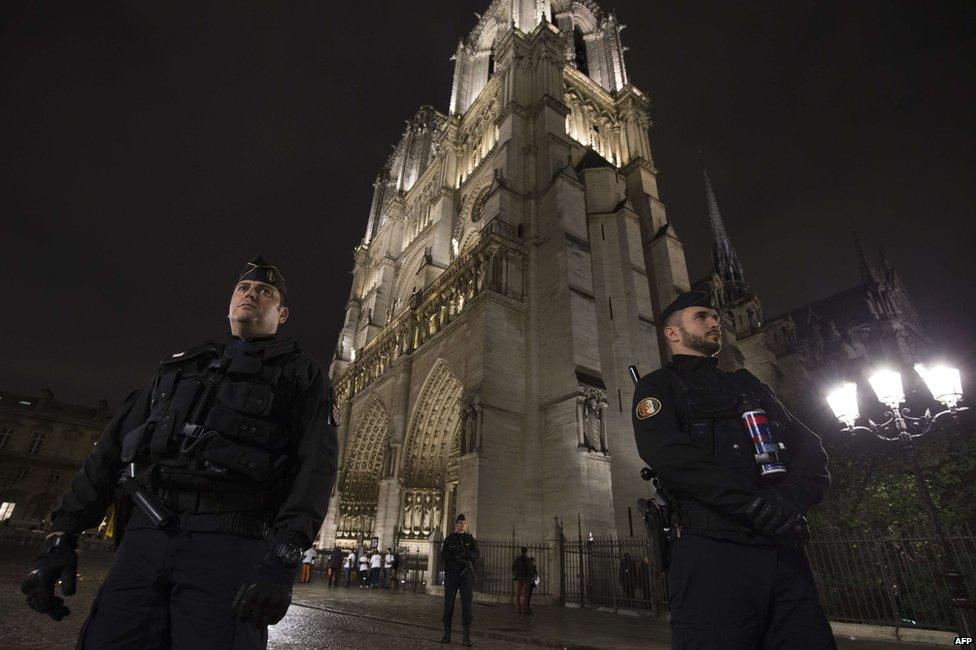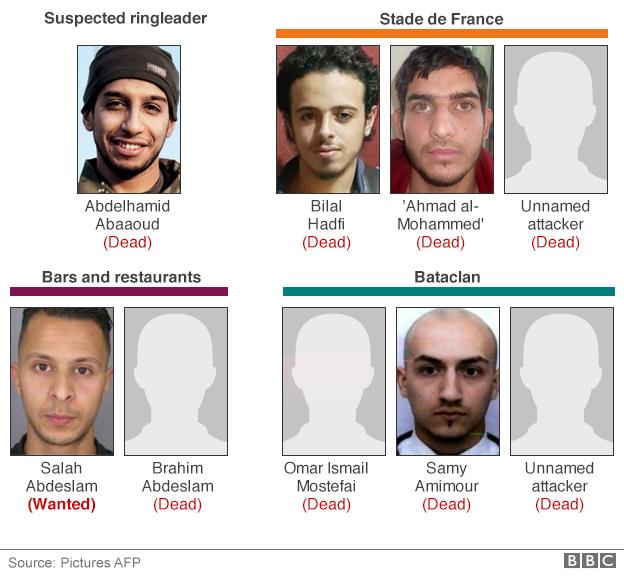Paris attacks: 'Ringleader' Abdelhamid Abaaoud killed in raid
- Published
Paris attacks: Who was Abdelhamid Abaaoud?
The suspected ringleader of the Paris attacks, Abdelhamid Abaaoud, was among those killed in a French police raid on Wednesday, prosecutors say.
They confirmed the Islamic State (IS) militant had died in a flat in the Paris suburb of Saint Denis.
His body was found riddled with bullets and shrapnel in the apartment.
Interior Minister Bernard Cazeneuve said he had received intelligence that Abaaoud had passed through Greece on his return from Syria.
It is unclear whether the Belgian had concealed himself among the thousands of migrants arriving in Greece before heading for other EU nations.
Friday's gun and suicide bomb attacks in the French capital left 129 people dead and hundreds injured.
Key questions remain after attacks
One of the other attackers, who blew himself up outside the Stade de France, was traced to Greece by his fingerprints, where he was registered as a migrant.
In other developments:
France presented a draft resolution at the UN calling for global support in the fight against IS
Nine people were arrested in Belgium after searches linked to the Paris attacks
New searches were also carried out in France
French President Francois Hollande has ordered an "intensification" of air strikes on IS targets in Iraq as well as Syria
French Prime Minister Manuel Valls warned that France could face chemical or biological attack from terror groups
The French Parliament has extended the state of emergency for a further three months from 26 November.

Police have been on patrol outside the famous Printemps department store in Paris

Notre Dame cathedral was under guard as darkness fell
Confirming Abaaoud left for Syria last year, Mr Cazeneuve said no EU states had signalled his return.
The minister also implicated Abaaoud in four out of six attacks foiled in France since this spring.
He was linked to a plot in April to attack a church near Paris. Police are also investigating a possible connection to the attack on a high-speed train from Amsterdam to Paris in August.
In Belgium, he had links to an Islamist cell that was broken up in a raid by security forces in the town of Verviers in January which led to the deaths of two gunmen.
Police sources told AFP news agency that the tip-off about Abaaoud's presence in Greece had come from Moroccan intelligence.
This audio, from French TV station TF1, is said to be Hasna Aitboulahcen who later died in an explosion, talking to police
Eight people were arrested and at least two killed in the raid on the property in Saint Denis. Heavily armed police stormed the building after a tip-off that Abaaoud was in Paris.
A woman at the flat - reported in French media to be Abaaoud's cousin - died during the raid after activating a suicide vest.
The prosecutor's office said it was still unclear whether Abaaoud had blown himself up or not. The 28-year-old was identified from his fingerprints.
Mr Cazeneuve told reporters that a non-EU state had alerted France on Monday that Abaaoud had been in Greece.
"Everyone must understand it is urgent that Europe wakes up, organises itself and defends itself against the terrorist threat," he said.
'I didn't know she was a suicide bomber'

Abaaoud's movements
2013: Said to have first visited Syria, joining the Islamic State group before slipping back to his home country, Belgium
20 January 2014: Passes through Germany's Cologne-Bonn airport, en route to the Turkish city of Istanbul. Returns to Syria, where he becomes one of the faces of IS propaganda
15 January 2015: His mobile phone is reportedly traced to Greece from calls made to an Islamist cell in Verviers, Belgium
16 November 2015: Three days after the Paris attacks, a foreign intelligence service alerts France that he is back in Europe, having passed through Greece; police receive a tip-off that he is on French territory
18 November 2015: Killed in police raid on Paris suburb of Saint Denis, five days after reportedly heading the attacks in Paris that left 129 people dead

The BBC's Hugh Schofield in Paris says the identification of Abaaoud raises serious questions for security services.
He was high on French and Belgian wanted lists and yet managed to travel from Syria to the heart of Paris without ever leaving a trace.
Investigators are still looking for another suspect, Salah Abdeslam, who is believed to have travelled to Belgium after the attacks on Friday night.
Tom Burridge reports from the street where police targeted the Paris attacks suspects


The Paris attackers
More on the Paris attacks
A doctor's story An emergency department medic describes his Friday night shift
Rethinking strategy Time for West to review its priorities in Syria
How vulnerable is Europe? Putting the dangers in perspective
What happened in Paris? How events unfolded on Friday evening in the French capital
Who were the victims? Details of some of the 129 people killed

Also on Thursday, Belgian police raided properties linked to Bilal Hadfi, who is believed to have blown himself up outside the Stade de France stadium during Friday's attacks.
Seven of the arrests were linked to Hadfi while the other two were connected more generally to the Paris attacks, prosecutors said.

What is Islamic State?
IS is a notoriously violent Islamist group which controls large parts of Syria and Iraq. It has declared its territory a caliphate - a state governed in accordance with Islamic law - under its leader Abu Bakr al-Baghdadi.
What does it want?
IS demands allegiance from all Muslims, rejects national borders and seeks to expand its territory. It follows its own extreme version of Sunni Islam and regards non-believers as deserving of death.
How strong is IS?
IS projects a powerful image, partly through propaganda and sheer brutality, and is the world's richest insurgent group. It has about 30,000 fighters but is facing daily bombing by a US-led multi-national coalition, which has vowed to destroy it.

Are you in the area? Have you been affected by what has been happening? Do you have any information you can share? If it is safe to do so, you can get in touch by emailing haveyoursay@bbc.co.uk, external
Please include a contact number if you are willing to speak to a BBC journalist. You can also contact us in the following ways:
WhatsApp: +44 7525 900971
Send pictures/video to yourpics@bbc.co.uk, external
Tweet: @BBC_HaveYourSay, external
Send an SMS or MMS to 61124 or +44 7624 800 100